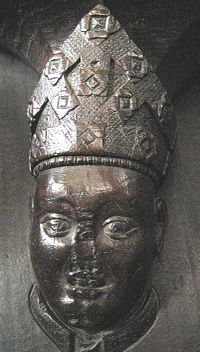Henry le Despenser
| Henry le Despenser | |
|---|---|
| Bishop of Norwich | |

14th-century carving of Henry le Despenser, misericord in a chancel stall in St. Margaret's Church, King's Lynn
|
|
| Installed | 12 July 1370 |
| Term ended | 23 August 1406 |
| Predecessor | Thomas Percy |
| Successor | Alexander Tottington |
| Other posts | Archdeacon of Llandaff (around 1364–?) Canon of Salisbury (?–1370) |
| Orders | |
| Ordination | 17 December 1362 |
| Consecration | 20 April 1370 |
| Personal details | |
| Born | c. 1341 |
| Died | 23 August 1406 Elmham, Norfolk |
| Denomination | Roman Catholic |
| Parents | Edward le Despenser & Anne Ferrers |
| Alma mater | Oxford University |
Henry le Despenser (c. 1341–1406) was a 14th-century English nobleman and Bishop of Norwich whose reputation as the 'Fighting Bishop' was gained for his part in suppressing the Peasants' Revolt in East Anglia and in defeating the peasants at the Battle of North Walsham in the summer of 1381.
As a young man he studied at Oxford University and held numerous positions in the English Church. He fought in Italy before being consecrated as a bishop in 1370. Parliament agreed to allow Despenser to lead a crusade to Flanders in 1383, which was directed against Louis II of Flanders, a supporter of the antipope Clement VII. The crusade was in defence of English economic and political interests. Although well funded, the expedition was poorly equipped and lacked proper military leadership. After initial successes, a disastrous attempt to besiege the city of Ypres forced Despenser to return to England. Upon his return he was impeached in parliament. His temporalities were confiscated by Richard II of England, but were returned in 1385, the year he accompanied the king northward to repel a potential French invasion of Scotland.
Despenser was an energetic and able administrator who staunchly defended his diocese against Lollardy. In 1399, he was among those who stood by Richard, following the landing of Henry Bolingbroke in Yorkshire towards the end of June. He was arrested for refusing to come to terms with Bolingbroke. The following year, he was implicated in the Epiphany Rising, but was pardoned.
...
Wikipedia
